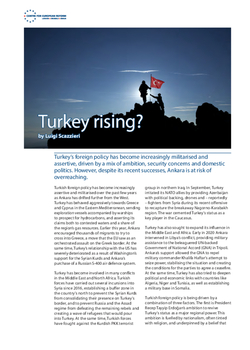
Turkey rising?
Turkey’s foreign policy has become increasingly militarised and assertive, driven by a mix of ambition, security concerns and domestic politics. However, despite its recent successes, Ankara is at risk of overreaching.
Turkish foreign policy has become increasingly assertive and militarised over the past few years as Ankara has drifted further from the West. Turkey has behaved aggressively towards Greece and Cyprus in the Eastern Mediterranean, sending exploration vessels accompanied by warships to prospect for hydrocarbons, and asserting its claims both to contested waters and a share of the region’s gas resources. Earlier this year, Ankara encouraged thousands of migrants to try to cross into Greece, a move that the EU saw as an orchestrated assault on the Greek border. At the same time, Turkey’s relationship with the US has severely deteriorated as a result of Washington’s support for the Syrian Kurds and Ankara’s purchase of a Russian S-400 air defence system.
Turkey’s foreign policy has become increasingly militarised and assertive, driven by a mix of ambition, security concerns and domestic politics. But Ankara risk overreaching.
Turkey has become involved in many conflicts in the Middle East and North Africa. Turkish forces have carried out several incursions into Syria since 2016, establishing a buffer zone in the country’s north to prevent the Syrian Kurds from consolidating their presence on Turkey’s border, and to prevent Russia and the Assad regime from defeating the remaining rebels and creating a wave of refugees that would pour into Turkey. At the same time, Turkish forces have fought against the Kurdish PKK terrorist group in northern Iraq. In September, Turkey irritated its NATO allies by providing Azerbaijan with political backing, drones and – reportedly – fighters from Syria during its recent offensive to recapture the breakaway Nagorno-Karabakh region. The war cemented Turkey’s status as a key player in the Caucasus.
Turkey has also sought to expand its influence in the Middle East and Africa. Early in 2020 Ankara intervened in Libya’s conflict, providing military assistance to the beleaguered UN-backed Government of National Accord (GNA) in Tripoli. Ankara’s support allowed the GNA to repel military commander Khalifa Haftar’s attempt to seize power, stabilising the situation and creating the conditions for the parties to agree a ceasefire. At the same time, Turkey has also tried to deepen political and economic links with countries like Algeria, Niger and Tunisia, as well as establishing a military base in Somalia.
Turkish foreign policy is being driven by a combination of three factors. The first is President Recep Tayyip Erdoğan’s ambition to revive Turkey’s status as a major regional power. This ambition is fuelled by nationalism, often tinted with religion, and underpinned by a belief that the global balance of power is shifting away from the West. Under Erdoğan, Turkey has sought to position itself as the leader of the Sunni world, prominently backing the cause of the Muslim Brotherhood, supporting the Palestinian cause and engaging in a struggle for supremacy with the rival bloc of the UAE, Egypt and Saudi Arabia.
The second factor driving Turkish foreign policy is a sense of insecurity created by a regional environment that has become more threatening – in part due to Ankara’s own actions. The conflict in Syria, with the emergence of ISIS on Turkey’s doorstep and the rise of the Kurdish YPG militia, has undermined Turkey’s security and created incentives for a more militarised foreign policy. Turkey feels that its Western allies have not taken its security concerns seriously. At the same time, as Ankara has become more assertive, it has prompted Cyprus, Egypt, France, Greece and the UAE to form a de-facto coalition to contain it, for example excluding Turkey from the exploitation of the Eastern Mediterranean’s gas resources. This has led to Ankara feeling surrounded and prompted it to be even more assertive.
The third factor driving Turkish foreign policy is domestic politics. Ankara’s shift towards a more militarised policy coincides with Erdoğan’s alliance with the ultranationalist Nationalist Movement Party (MHP) and the failure of the peace process with the PKK in 2015. At the same time, with Turkey’s economy in deep crisis and growing domestic opposition to his government, pursuing an assertive foreign policy has become a tool for Erdoğan to boost his popularity. Turkey’s successes abroad have fed a sense of national pride. Moreover, it is difficult for the opposition to criticise the government’s foreign policy. For example, Ankara’s stance on maritime boundaries in the Eastern Mediterranean is not new and is shared by the opposition.
Turkey’s more assertive foreign policy has also been fuelled by Donald Trump’s willingness to strike deals with Erdoğan, for example removing US troops from the Syrian-Turkish border to allow Turkey to attack the YPG in Syria in October 2019, and showing restraint in penalising Turkey for the purchase of the S-400, resisting pressure from Congress to impose economic sanctions. At the same time, the lack of US engagement in the Middle East under Trump allowed rivalry between Turkey and its regional adversaries to escalate.
Fear of financial collapse, combined with COVID-19, pressure from the US and EU and worries about a clash with Russia could nudge Ankara into a less confrontational attitude towards the West. Erdoğan is pragmatic enough to adjust course to avoid catastrophic outcomes, as shown by his early November decision to replace Turkey’s finance minister and central bank governor and to rhetorically embrace the need for reform to prevent a full-blown economic crisis. Erdoğan might also decide to end naval operations aimed at Greece and Cyprus, and seek a compromise with Washington so the S-400s are not deployed – if he thinks that doing so is necessary.
Fear of financial collapse, combined with COVID-19, pressure from the US and EU and worries about a clash with Russia could nudge Ankara into a less confrontational attitude towards the West.
However, Turkey’s foreign policy trajectory is unlikely to change in a significant way, because Erdoğan will not abandon his ambition for Turkey to become a major power and will continue to try to advance its influence in the Middle East and Africa, even if he reduces tensions with Europe and the US. Moreover, Erdoğan has lost many moderate voters in the past few years, and he is unlikely to regain them so long as the economy remains weak. Appealing to nationalism may offer the only possible path to victory in the next elections, scheduled for 2023.
The more Ankara asserts itself, the more it will be at risk of overreaching. Its military efforts, based on using a mix of Syrian mercenaries and drones, have been both low-cost and successful so far, and Turkey has established itself as one of the major players in many of the conflicts in the Middle East and North Africa. However, Ankara seems to lack a clear end goal for many of the regional conflicts it is involved in. For example, it is difficult to see how it can extricate itself from the conflict in Syria. Moreover, Turkey’s room for manoeuvre is likely to be increasingly constrained by its rivalry with Russia, and by Greece, Egypt, the UAE and France increasing their co-operation to contain its ambitions in the region.
Europe and the US will have to craft an approach towards Turkey that maintains co-operation in areas of shared interest like countering terrorism, steers Ankara away from direct confrontation and also tries to defuse the rivalry between Turkey and its adversaries. Joe Biden’s election as US President makes it more likely that the US will be willing to pressure Ankara to reduce tensions, and this will embolden the EU to follow suit. At the same time, Europe and the US should do their best to ease tensions between Turkey and its neighbours, especially in the Eastern Mediterranean, to prevent escalation and a potential rupture between Turkey and the West.
Luigi Scazzieri is a research fellow at the Centre for European Reform.

